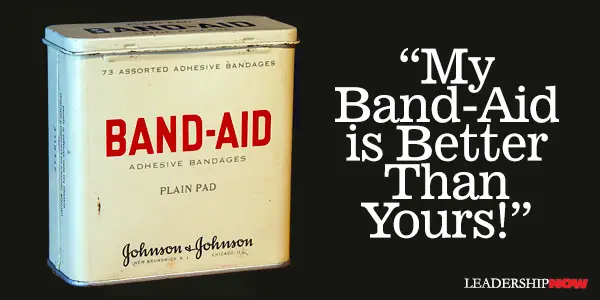 |
 |
06.03.22

“My Band-Aid is Better Than Yours!”
TODAY, far too many leaders are arguing over Band-Aids. They see problems and react with Band-Aids. All around us, we see the result of Band-Aids. Most of the contentious issues of the day are over band-aids. “My Band-Aid is better than yours!” It feels like we’re doing something, but in reality, we’re just putting a Band-Aid on the symptom. Band-Aids are a reaction, not a preventative. Band-Aids are meant to cover a problem with the assumption that there is healing taking place underneath. But as we have seen historically, that just doesn’t happen. We cover it up and walk away, leaving the real issues to fester and grow. Band-Aids cause us to miss the deeper dscussions we need to be having. Band-Aids answer the wrong questions. For too many decades, we have been applying Band-Aids without doing anything to heal the issue. Most rules and laws are just Band-Aids. Most noticeably and pervasively, in the 1960s, we began to look the other way. And now we have nightmares. We are reaping the consequences of that decision. We have a character problem. We have a values problem. It’s character that we need to be addressing. And character issues are first dealt with in the home. And that includes the use of rules. But foundational rules that guide behavior in the right direction. Not a codebook of rule upon rule—Band-Aids to fix what’s not happening in the first place. Fundamentally, character development is a parenting issue. By coddling generations of youth, even well-intentioned coddling, we have set them and society up for failure. Coddling makes people think that the problems are “out there” instead of “in-here”—inside all of us. Safe spaces only serve to deepen divides. Seeking out and understanding differences builds an appreciation of the positive intent of others. Our most vocal leaders in government, communities, and families raise their voices for Band-Aids because they either don’t know or do not have the courage to lead the hard choices that need to be made to address character issues. Taking the time to understand and deal with the underlying issues doesn’t stand a chance under the pressure to attenuate and appease the uninformed, loud, and reactionary voices. The problem is when you are working on character issues, it looks like you are doing nothing. Ironically, you are doing everything. Dealing with the real problem is not just time-consuming but painful. It means admitting that we’re wrong, that we’ve gotten off track. Band-Aids push the responsibility for a real solution off on someone else. When in reality, the solution is with each of us. But that’s hard. Sadly, we applaud people who march for Band-Aids and never deal with the issues. We need a different kind of march. March for being better people. March for inclusiveness. March for self-control. March for real-world relationships. March for civility. March for character. There’s something disingenuous about getting in someone’s face and screaming about controlling them. Love doesn’t make you do crazy things. Love forgives. Love is patient. Unchecked emotions may trigger compromising thoughts, but character keeps those thoughts in check. We created the world we live in both individually and as a society. If we don’t like it, it’s time to change who we are—not make more rules. More rules will not stop people who are inclined to disregard them anyway. It happens in families and organizations, but it has never been so obvious as it is in government. Instead of leading, they are reacting. It shouldn’t come as a surprise, I guess. As Maslow pointed out, if the only tool you have is a hammer, you treat everything as if it were a nail. If you are a lawmaker, you try to address every problem with a law. Even then, most laws are not designed to solve a problem but to push an agenda. We’re just kicking the can down the road. We need to stop arguing over Band-Aids and come together on the underlying character issues. We divide over Band-Aids instead of uniting over character. The values that molded the Greatest Generation, for example, have been slowly brushed aside for more superficial values. Character doesn’t just happen; it is forged. We have neglected our responsibilities in the faith that posting another law will solve the problem. Times like these provide us with the opportunity to rediscover our values—values we have forgotten. For now, what can we do? Start where we can do the most good. Start with ourselves. Start at home. We must discipline ourselves before we attempt to restrict others—self-regulation. We must order our own circumstances before we go to work on others. Perhaps we all need to put away the Band-Aids and focus on the source of the issue. Then we’ll find that we don’t need another rule.
Posted by Michael McKinney at 07:13 AM
|
BUILD YOUR KNOWLEDGE
 

How to Do Your Start-Up Right STRAIGHT TALK FOR START-UPS 
Grow Your Leadership Skills NEW AND UPCOMING LEADERSHIP BOOKS 
Leadership Minute BITE-SIZE CONCEPTS YOU CAN CHEW ON 
Classic Leadership Books BOOKS TO READ BEFORE YOU LEAD |